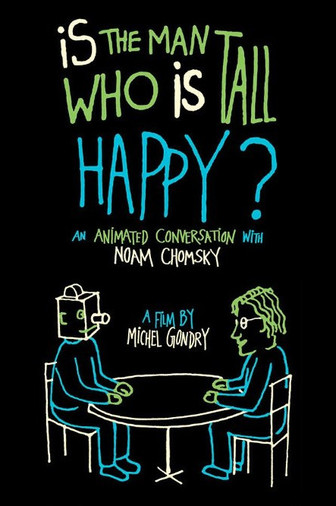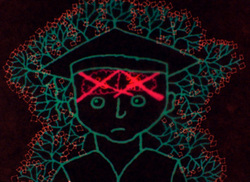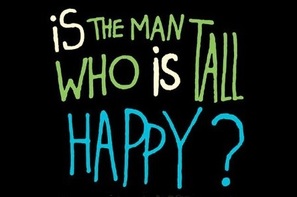
Reviewed by Betsy Sharkey – LA Times
Academic and author Noam Chomsky is a creative but very structural thinker, stringing ideas together like dominoes. One thought progresses to the next, carefully placed with a logic and precision born of years of linguistics analysis shoring up each one.
Filmmaker Michel Gondry is a creative thinker as well, though he's more deconstructive in his methods. Enthralled by the process of pulling ideas apart, he's not content with tipping a single domino, but crashing the entire pile, then setting about to make sense of the jumble.
So you might expect a conversation between the filmmaker and the philosopher — which frames Gondry's extraordinary new animated documentary "Is the Man Who Is Tall Happy?" — to be unusual.
Unusual doesn't begin to capture the experience of this most unconventional of films.
Chomsky's specialty is linguistics and cognitive science. He's in the business of examining language for clues about life. With Chomsky's help, Gondry wants to probe the MIT professor's studies into the way in which words give shape to our world, defining how we humans feel, think and relate in the broadest sense. But Gondry is also interested in the specific — Chomsky — and how language, ideas and experiences intersect in his very particular life.
Their conversations took place over the course of a couple of years starting in 2010. Gondry set some arbitrary deadlines because, as he so bluntly puts it in the film, he wanted to show the finished work to Chomsky before he died. The professor turns 85 in December.
There is a bit of the wistful student in that phrase, and in the texture of the film. Wistful, insistent, intellectually discontent. Gondry's like the kid in the class who keeps pressing the professor to explain and expound. Chomsky is by turns patient and exasperated —- not so much at the probing, but when he thinks Gondry doesn't understand.
It is fitting that tension in the film comes from an issue of "understanding," Gondry sometimes chalking it up to his thick French accent.
Gondry chalks it up in other ways as well. Discourse may be driving the narrative, but what we see on screen is a kaleidoscope of images. Gondry uses a colorful neon-bright, hand-drawn, pulsating animation style to show us how he is processing the countless words he is hearing. It's as if the ideas, rather than Gondry, are holding the chalk.
If you know and appreciate the director's work in feature films, "Is the Man Who Is Tall?" serves to illuminate the filmmaker as much as his subject. The idea of ideas is very much at the core of Gondry's 2006 film "The Science of Sleep," with Gael García Bernal as a man who loses sight of the line between daydreams and reality, and the seminal 2004 "Eternal Sunshine of the Spotless Mind," which examines the implications of a world where disturbing memories can be erased.
When Gondry says he had to do this film with Chomsky, you believe him.
In addition to the wide-ranging interviews and the animation, some of Gondry's observations are written out like chalk on a board as he talks. Even that simple act — the writing of words, the way an idea slowly comes into focus as the words are put down — becomes a recurring theme.
Which brings us to the title: "Is the Man Who Is Tall Happy?"
Near the end, Chomsky and Gondry get into the specific way in which the structure of language impacts thought — it is what the MIT professor has spent a lifetime exploring. It is mesmerizing to see those seven words structured, then restructured, Chomsky explaining why we choose to place words where, how meaning shifts accordingly.
The film isn't a very long one but it is a saturated one, so much thinking on screen. In addition to Gondry's drawings and some photo collages, the director occasionally sketches out a camera and projects footage of Chomsky, as if we will forget this is a film. I don't know whether the tall man is happy, but I do know that "Is the Man Who Is Tall Happy?" is intellectually and visually groundbreaking, and most certainly a film.
Academic and author Noam Chomsky is a creative but very structural thinker, stringing ideas together like dominoes. One thought progresses to the next, carefully placed with a logic and precision born of years of linguistics analysis shoring up each one.
Filmmaker Michel Gondry is a creative thinker as well, though he's more deconstructive in his methods. Enthralled by the process of pulling ideas apart, he's not content with tipping a single domino, but crashing the entire pile, then setting about to make sense of the jumble.
So you might expect a conversation between the filmmaker and the philosopher — which frames Gondry's extraordinary new animated documentary "Is the Man Who Is Tall Happy?" — to be unusual.
Unusual doesn't begin to capture the experience of this most unconventional of films.
Chomsky's specialty is linguistics and cognitive science. He's in the business of examining language for clues about life. With Chomsky's help, Gondry wants to probe the MIT professor's studies into the way in which words give shape to our world, defining how we humans feel, think and relate in the broadest sense. But Gondry is also interested in the specific — Chomsky — and how language, ideas and experiences intersect in his very particular life.
Their conversations took place over the course of a couple of years starting in 2010. Gondry set some arbitrary deadlines because, as he so bluntly puts it in the film, he wanted to show the finished work to Chomsky before he died. The professor turns 85 in December.
There is a bit of the wistful student in that phrase, and in the texture of the film. Wistful, insistent, intellectually discontent. Gondry's like the kid in the class who keeps pressing the professor to explain and expound. Chomsky is by turns patient and exasperated —- not so much at the probing, but when he thinks Gondry doesn't understand.
It is fitting that tension in the film comes from an issue of "understanding," Gondry sometimes chalking it up to his thick French accent.
Gondry chalks it up in other ways as well. Discourse may be driving the narrative, but what we see on screen is a kaleidoscope of images. Gondry uses a colorful neon-bright, hand-drawn, pulsating animation style to show us how he is processing the countless words he is hearing. It's as if the ideas, rather than Gondry, are holding the chalk.
If you know and appreciate the director's work in feature films, "Is the Man Who Is Tall?" serves to illuminate the filmmaker as much as his subject. The idea of ideas is very much at the core of Gondry's 2006 film "The Science of Sleep," with Gael García Bernal as a man who loses sight of the line between daydreams and reality, and the seminal 2004 "Eternal Sunshine of the Spotless Mind," which examines the implications of a world where disturbing memories can be erased.
When Gondry says he had to do this film with Chomsky, you believe him.
In addition to the wide-ranging interviews and the animation, some of Gondry's observations are written out like chalk on a board as he talks. Even that simple act — the writing of words, the way an idea slowly comes into focus as the words are put down — becomes a recurring theme.
Which brings us to the title: "Is the Man Who Is Tall Happy?"
Near the end, Chomsky and Gondry get into the specific way in which the structure of language impacts thought — it is what the MIT professor has spent a lifetime exploring. It is mesmerizing to see those seven words structured, then restructured, Chomsky explaining why we choose to place words where, how meaning shifts accordingly.
The film isn't a very long one but it is a saturated one, so much thinking on screen. In addition to Gondry's drawings and some photo collages, the director occasionally sketches out a camera and projects footage of Chomsky, as if we will forget this is a film. I don't know whether the tall man is happy, but I do know that "Is the Man Who Is Tall Happy?" is intellectually and visually groundbreaking, and most certainly a film.







